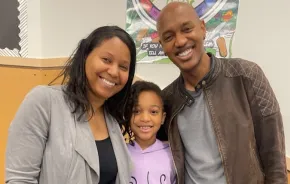 It’s 10 p.m. — do you know where your tween or teen is? Perhaps watching TV in his or her bedroom? Not ideal, you know, but you figure a couple of hours a day of TV won’t hurt him or her. Think again.
It’s 10 p.m. — do you know where your tween or teen is? Perhaps watching TV in his or her bedroom? Not ideal, you know, but you figure a couple of hours a day of TV won’t hurt him or her. Think again.
“Kids who spend more time watching TV have lower grades and fewer extracurricular activities,” says Katharine Heintz, Ph.D., a media analyst and researcher on the impact of electronic media on children and families. Heintz also says research shows a link between excessive TV viewing in tweens and teens and depression — and that’s not all.
“Body-image issues are a challenge already for teens, but excessive television viewing can make it even worse,” Heintz says. “Girls can respond by trying to get even smaller by excessive exercise and dieting, and boys by getting bigger by abusing steroids.”
Excessive television viewing may also impact a critical brain development milestone in teens, that of learning how to focus. Heinz says, “If we don’t give teens opportunities to focus, they won’t know how to do it as adults.”
How much is too much?
The American Academy of Pediatrics recommends that kids younger than 2 years old not watch any TV, and that those older than 2 watch no more than one to two hours a day of quality programming.
But, according to Heintz, the reality is that most kids spend five and a half hours in front of a TV each day and a total of 11 hours a day of “screen time” (a combination of televisions, “smart phones,” computers and other screens). “As technologies get more portable, smaller and lighter, it makes it easier to watch all the time and eliminate any downtime,” Heintz says.
What to do
Start by changing bad habits. Break existing teen routines of watching TV all afternoon until the parent gets home, for instance. Instead, sign teens up for an after-school activity, suggests Heintz. “And if the TV goes on right after dinner, change that routine as well and have a discussion while they help you clean up.”
Limiting television time can be challenging — and takes an act of will. Shelly Zollman is mother to a 13-year-old boy and 10-year-old girl. She and her husband co-own a Web design company. She considers her family atypical in their TV habits, because her kids watch very little television, except for an occasional Nickelodeon episode on Hulu.
“People always think that since we’re in a tech field and are on the computer all the time, our kids must be as well,” Zollman says. But the Zollmans have consciously limited “screen time” in favor of other things — what they call “real experiences.” Her son’s favorite example of this is a Lego video game that allows players to build models on the computer. “He thought it was crazy to substitute doing it on the computer instead of actually building stuff with Legos.”
Set limits that make sense for your family, and avoid letting teens have a TV in their room. Television viewing should be a shared experience when possible, Heintz says, so that parents can discuss what the tween or teen is seeing and if the content matches their family values.
Heintz recommends the TV and movie reviews at Common Sense Media or the Movie Mom blog, which offer reviews and suggestions for conversations you can have with your kids.
And there’s another good reason to watch TV with your kids, according to media expert Kathryn Montgomery, Ph.D. — to help their kids become conscious media consumers. Montgomery, a professor at American University’s School of Communications, says research shows tweens and teens are particularly vulnerable to media messages and advertising. “Teen’s brains aren’t completely developed, particularly the area that governs judgment,” she says. Tweens and teens are trying to figure out “who they want to be in the world and are much more attuned to external stimuli and their peers” than are younger kids.
So, watch your kids’ favorite shows with them, Montgomery says — and bite your tongue. “Try to engage in discussions and not be judgmental.” Instead, point out media messages that don’t agree with your family’s values — and nix shows that just aren’t a good fit.
“My philosophy is that TV isn’t all bad, but that people should watch purposefully,” says Zollman. “Our kids would love to chill out and watch the tube sometimes, but they rarely ask to watch. I think reducing or eliminating TV is like any addiction — it’s difficult at first, but then you really don’t miss it that much.”
Kathleen F. Miller’s kids can entertain themselves for hours with a roll of tape, some paper, shoe box and markers, probably due to their very limited diet of “screen time.”











